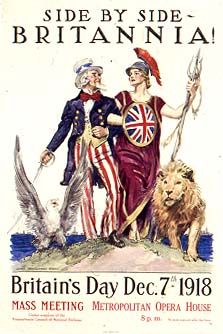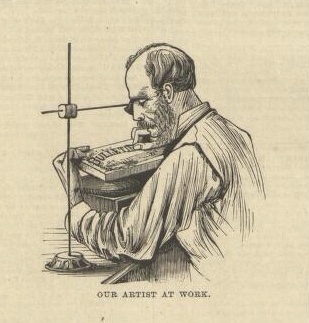|
Little Boy From Manly
The Little Boy from Manly was a national personification of New South Wales and later Australia created by the cartoonist Livingston Hopkins of ''The Bulletin'' in April 1885. In March 1885, as the New South Wales Contingent was about to depart for the Sudan, a letter was addressed to Premier William Bede Dalley containing a cheque for £25 for the Patriotic Fund 'with my best wishes from a little boy at Manly'. It was Australia's first overseas military adventure, and the little boy became a symbol either of Australian patriotism or, among opponents of the adventure, of mindless chauvinism Chauvinism is the unreasonable belief in the superiority or dominance of one's own group or people, who are seen as strong and virtuous, while others are considered weak, unworthy, or inferior. It can be described as a form of extreme patriotism .... Hopkins put the boy in a cartoon, dressed in the pantaloons and frilled shirt associated with English storybook schoolboys of the namby-pa ... [...More Info...] [...Related Items...] OR: [Wikipedia] [Google] [Baidu] |
National Personification
A national personification is an anthropomorphic personification of a state or the people(s) it inhabits. It may appear in political cartoons and propaganda. Some early personifications in the Western world tended to be national manifestations of the majestic wisdom and war goddess Minerva/Athena, and often took the Latin name of the ancient Roman province. Examples of this type include Britannia, Germania, Hibernia, Hispania, Helvetia and Polonia. Examples of personifications of the Goddess of Liberty include Marianne, the Statue of Liberty (''Liberty Enlightening the World''), and many examples of United States coinage. Another ancient model was Roma, a female deity who personified the city of Rome and more broadly, the Roman state, and who was revived in the 20th Century as the personification of Mussolini's " New Roman Empire". Examples of representations of the everyman or citizenry in addition to the nation itself are Deutscher Michel, John Bull and Uncle Sam.Eric ... [...More Info...] [...Related Items...] OR: [Wikipedia] [Google] [Baidu] |
New South Wales
) , nickname = , image_map = New South Wales in Australia.svg , map_caption = Location of New South Wales in AustraliaCoordinates: , subdivision_type = Country , subdivision_name = Australia , established_title = Before federation , established_date = Colony of New South Wales , established_title2 = Establishment , established_date2 = 26 January 1788 , established_title3 = Responsible government , established_date3 = 6 June 1856 , established_title4 = Federation , established_date4 = 1 January 1901 , named_for = Wales , demonym = , capital = Sydney , largest_city = capital , coordinates = , admin_center = 128 local government areas , admin_center_type = Administration , leader_title1 = Monarch , leader_name1 = Charles III , leader_title2 = Governor , leader_name2 = Margaret Beazley , leader_title3 = Premier , leader_name3 = Dominic Perrottet ( Liberal) , national_representation = Parliament of Australia , national_representation_type1 = Sen ... [...More Info...] [...Related Items...] OR: [Wikipedia] [Google] [Baidu] |
Australia
Australia, officially the Commonwealth of Australia, is a sovereign ''Sovereign'' is a title which can be applied to the highest leader in various categories. The word is borrowed from Old French , which is ultimately derived from the Latin , meaning 'above'. The roles of a sovereign vary from monarch, ruler or ... country comprising the mainland of the Australian continent, the island of Tasmania, and numerous smaller islands. With an area of , Australia is the largest country by area in Oceania and the world's sixth-largest country. Australia is the oldest, flattest, and driest inhabited continent, with the least fertile soils. It is a megadiverse country, and its size gives it a wide variety of landscapes and climates, with deserts in the centre, tropical Forests of Australia, rainforests in the north-east, and List of mountains in Australia, mountain ranges in the south-east. The ancestors of Aboriginal Australians began arriving from south east Asia approx ... [...More Info...] [...Related Items...] OR: [Wikipedia] [Google] [Baidu] |
Cartoonist
A cartoonist is a visual artist who specializes in both drawing and writing cartoons (individual images) or comics (sequential images). Cartoonists differ from comics writers or comic book illustrators in that they produce both the literary and graphic components of the work as part of their practice. Cartoonists may work in a variety of formats, including booklets, comic strips, comic books, editorial cartoons, graphic novels, manuals, gag cartoons, storyboards, posters, shirts, books, advertisements, greeting cards, magazines, newspapers, webcomics, and video game packaging. Terminology Cartoonists may also be denoted by terms such as comics artist, comic book artist, graphic novel artist or graphic novelist. Ambiguity may arise because "comic book artist" may also refer to the person who only illustrates the comic, and "graphic novelist" may also refer to the person who only writes the script. History The English satirist and editorial cartoonist William H ... [...More Info...] [...Related Items...] OR: [Wikipedia] [Google] [Baidu] |
Livingston Hopkins
Livingston York Yourtee "Hop" Hopkins (7 July 1846 – 21 August 1927)B. G. Andrews,, '' Australian Dictionary of Biography'', Volume 4, MUP, 1972, pp 421-422. Retrieved 2 August 2009 was an American-born cartoonist who became a major figure in Australian cartooning during the period surrounding the Federation of Australia. He is best known for his work with ''The Bulletin''. He is also notable for drawing one of the earliest newspaper comic strips, ''Professor Tigwissel's Burglar Alarm''. Early life Hopkins was born in Bellefontaine, Ohio, son of Daniel Hopkins (1800–1849), surveyor, and his wife Sarah, ''née Carter''. He was the thirteenth of 14 children. His family were Methodists, and his upbringing was somewhat hard and puritanical. When his father died, his mother was left with a home and a small estate. The boy went to the district school, and from the age of 14 years worked at various avocations until 1864 when he enlisted in the 130th Ohio Volunteer Regiment to ... [...More Info...] [...Related Items...] OR: [Wikipedia] [Google] [Baidu] |
The Bulletin (Australian Periodical)
''The Bulletin'' was an Australian weekly magazine first published in Sydney on 31 January 1880. The publication's focus was politics and business, with some literary content, and editions were often accompanied by cartoons and other illustrations. The views promoted by the magazine varied across different editors and owners, with the publication consequently considered either on the left or right of the political spectrum at various stages in its history. ''The Bulletin'' was highly influential in Australian culture and politics until after the First World War, and was then noted for its nationalist, pro-labour, and pro-republican writing. It was revived as a modern news magazine in the 1960s, and after merging with the Australian edition of Newsweek in 1984 was retitled ''The Bulletin with Newsweek''. It was Australia's longest running magazine publication until the final issue was published in January 2008. Early history ''The Bulletin'' was founded by J. F. Archibald and ... [...More Info...] [...Related Items...] OR: [Wikipedia] [Google] [Baidu] |
New South Wales Contingent
The New South Wales Contingent served in Sudan with British forces as part of the Suakin Expedition in 1885. Consisting of an infantry battalion, an artillery battery, and a small field ambulance detachment, it departed from Sydney on 3 March 1885. Arriving at Suakin on 29 March it ultimately saw little action, being involved in a minor action at Tamai on 3 April, and another at Takdul on 6 May. However, with the British deciding to abandon the campaign it re-embarked on 17 May and returned to Sydney on 19 June 1885, where it was disbanded. The New South Wales Contingent was the first military contingent to be raised and deployed overseas by an Australian colony. History During the early years of the 1880s, an Egyptian regime in the Sudan, backed by the British, came under threat from rebellion under the leadership of native Muhammad Ahmad (or Ahmed), known as Mahdi to his followers. In 1883, as part of the Mahdist War, the Egyptians sent an army to deal with the revolt, but t ... [...More Info...] [...Related Items...] OR: [Wikipedia] [Google] [Baidu] |
Nile Expedition
The Nile Expedition, sometimes called the Gordon Relief Expedition (1884–85), was a British mission to relieve Major-General Charles George Gordon at Khartoum, Sudan. Gordon had been sent to the Sudan to help Egyptians evacuate from Sudan after Britain decided to abandon the country in the face of a rebellion led by self-proclaimed Mahdi, Mahommed Ahmed. A contingent of Canadians was recruited to help the British navigate their small boats up the Nile River. The Nile Expedition was the first overseas expedition by Canadians in a British imperial conflict, although the Nile Voyageurs were civilian employees and did not wear uniforms. The expedition was commanded by Garnet Wolseley. After Commander Herbert Stewart was mortally wounded, Brigadier-General Charles William Wilson took command of an advance party of about 1,400 men. On two Nile steamers Wilson's Desert Column reached Khartoum in the afternoon of 28 January 1885. It came two days too late: Khartoum had been sei ... [...More Info...] [...Related Items...] OR: [Wikipedia] [Google] [Baidu] |
William Bede Dalley
William Bede Dalley (5 July 1831 – 28 October 1888) was an Australian politician and barrister and the first Australian appointed to the Privy Council of the United Kingdom. He was a leading lay representative and champion of the Catholic community and was known for his parliamentary and legal eloquence. Early life Dalley was born at Sydney in 1831 to Irish parents, John Dalley and Catherine Spillane, who were both convicts. He was educated at the Sydney College and St Mary's College. He was called to the bar in 1856. Political career In 1857 Dalley was elected to the Legislative Assembly as a representative of Sydney (City). In 1858 he successfully contested Cumberland Boroughs to help Charles Cowper's re-election in Sydney. He pressed for several reforms including an unsuccessful attempt to abolish the death penalty for rape. He joined the second Cowper ministry as Solicitor General in November 1858, but held this position for only three months. In 1859 he became th ... [...More Info...] [...Related Items...] OR: [Wikipedia] [Google] [Baidu] |
Australian Patriotism
Australian patriotism is patriotism involving cultural attachment of Australians to Australia as their homeland. Australian patriotism has been identified by some as distinct from Australian nationalism because of the emphasis of Australian patriotism upon values rather than a commitment to a nation. According to the 2014 World Values Survey, over 90 per cent of Australians are either "very proud" or "quite proud" of their nation. See also * Australianism (other) * Australophile * Australian nationalism * God's Own Country * Reclaiming Patriotism Reclaiming Patriotism: Nation-Building for Australian Progressives is a 2009 book by Tim Soutphommasane published by Cambridge University Press. It's the lead title of the Australian Encounters series which argues that the Australian left have mi ... References {{Australia-stub ... [...More Info...] [...Related Items...] OR: [Wikipedia] [Google] [Baidu] |
Chauvinism
Chauvinism is the unreasonable belief in the superiority or dominance of one's own group or people, who are seen as strong and virtuous, while others are considered weak, unworthy, or inferior. It can be described as a form of extreme patriotism and nationalism, a fervent faith in national excellence and glory. In English, the word has come to be used in some quarters as shorthand for male chauvinism, a trend reflected in ''Merriam-Webster's Dictionary'', which, as of 2018, begins its first example of use of the term ''chauvinism'' with "an attitude of superiority toward members of the opposite sex". As nationalism According to legend, French soldier Nicolas Chauvin was badly wounded in the Napoleonic Wars and received a meager pension for his injuries. After Napoleon abdicated, Chauvin maintained his fanatical Bonapartist belief in the messianic mission of Imperial France, despite the unpopularity of this view under the Bourbon Restoration. His single-minded devotion to his cau ... [...More Info...] [...Related Items...] OR: [Wikipedia] [Google] [Baidu] |





